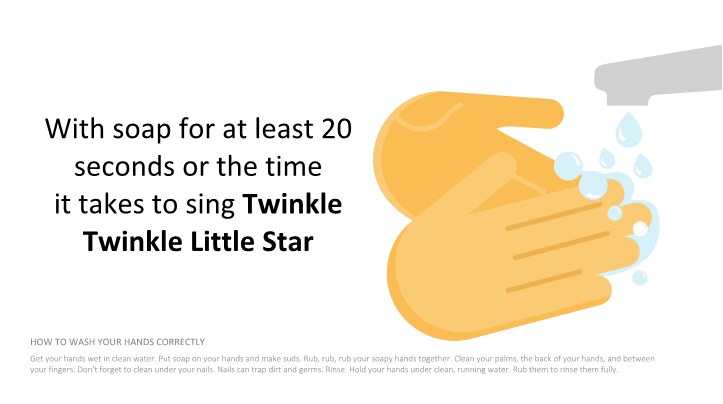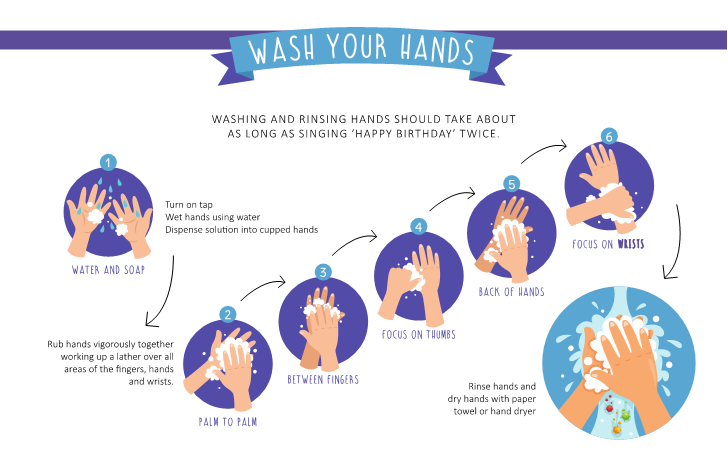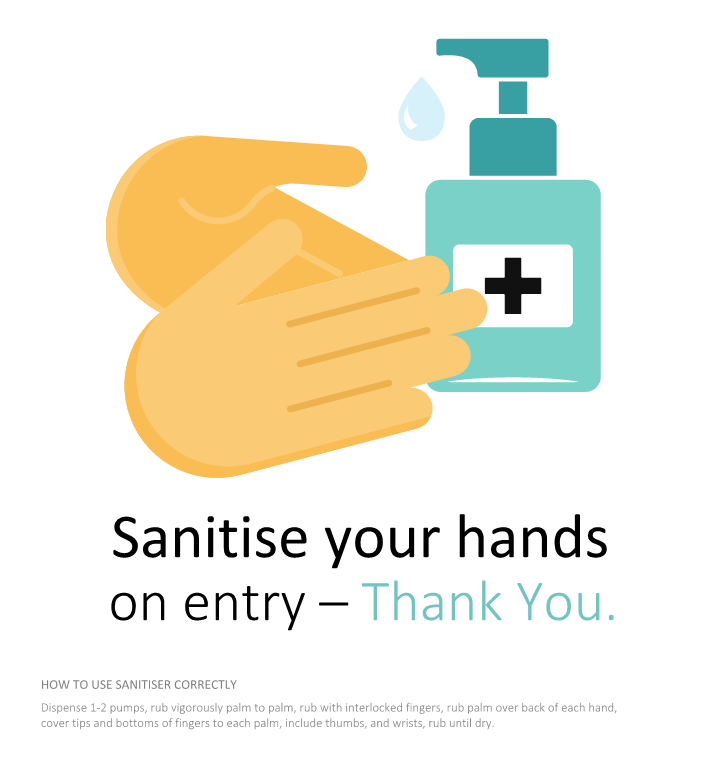Handwashing Policy
Policy Content
Having and encouraging effective hygiene practices in early childhood is essential for reducing the risk of infection. Helping children to develop appropriate personal hygiene habits, such as hand hygiene, will become embedded as they grow and develop. It is important to work with families to ensure children follow simple hygiene rules by incorporating effective hygiene strategies in both the School and home environment.National Quality Standard (NQS)
| Quality Area 2: Children's Health and Safety |
|---|
| 2.1 | Health | Each child’s health and physical activity is supported and promoted. |
| 2.1.2 | Health Practices and Procedures | Effective illness and injury management and hygiene practices are promoted and implemented. |
| 2.2 | Safety | Each child is protected. |
| 2.2.1 | Supervision | At all times, reasonable precautions and adequate supervision ensure children are protected from harm and hazard. |
Purpose
Our School is committed to ensuring the health and safety of all educators, staff, volunteers, families, and children by providing a safe and healthy environment. Effective hand hygiene significantly reduces the risk of infection and is, therefore, of the utmost importance. We aim to implement specific hand-washing hygiene practices regularly to minimise the risks associated with the cross-infection of viral and bacterial-borne diseases.Scope
This policy applies to children, families, staff, management, and visitors of the School.Implementation
Infection can be spread through direct physical contact between people, airborne droplets from coughing and sneezing or from contact with surfaces and objects. Children come into contact with a number of other children and adults, toys, eating utensils, and equipment whilst being cared for in early education and care services. This high degree of physical contact with people and the environment creates a higher risk of children being exposed to and spreading infectious illnesses. Whilst it may not be possible for services to prevent the spread of all infections, we aim to create a hygienic environment to minimise the spread of diseases and infections.Effective hand washing is a vital strategy in the prevention of the spreading of many infectious diseases. Research emphasises effective and frequent handwashing as the single most important way to reduce the spread of bacteria, germs, viruses, and parasites that may infect educators, staff and children in early childhood services and in our general population.
Micro-organisms such as bacteria, germs, viruses, and parasites are present on the hands at all times and live in the oil that is naturally produced on our hands. The use of soap or detergent and water removes most of these organisms and decreases the risk of cross-infection.
Our School will adhere to National Regulation requirements, standards and guidelines to support the effectiveness of our hand-washing policy. We aim to educate and encourage children to wash their hands frequently and effectively, which will help to reduce the incidence of infectious diseases, adhering to guidelines provided in Staying healthy: Preventing infectious diseases in early childhood education and care services and recommendations by the Department of Health - Australian Health Protection Principal Committee (AHPPC) to guide best practice.
Governance
To ensure the greatest level of personal hygiene, our School will ensure:- hands are thoroughly dried using a hand towel and disposed of in the bin provided
- disposable tissues are used to wipe noses, eyes or mouths and disposed of in the bin provided immediately after use
- hands are washed following the use of tissues
- hands are washed thoroughly using soap and water before and after using the toilet
- signage is provided to prompt visitors and children to wash their hands regularly and effectively when visiting our School.
- all staff wash their hands with soap and water for at least 20 seconds regularly throughout the day
- all staff wash/santise their hands
- before and after eating and handling food
- before and after preparing bottles for infants
- after applying sunscreen or other lotions to children
- after using the toilet
- after blowing their own nose
- after helping children use the toilet
- after touching animals
- after cleaning high-touch surfaces - (tables, light switches, door handles, computers, iPads)
- after cleaning or mopping floors
- after changing learning environments – rooms, indoor/outdoor
- whenever their hands are visibly dirty (after gardening, mud play, painting)
- educators and staff adhere to effective food preparation and food handling procedures
- educators and staff wash hands before and after wearing disposable gloves when:
- nappy changing
- preparing food
- administering medication
- administering first aid
- cleaning spills- faeces, vomit or blood
- cleaning with disinfectant or chemicals
- after handling garbage and/or contaminated materials (nappies and other waste products)
- children are explicitly taught the correct process of hand washing
- children are carefully supervised when handwashing
- children are reminded to wash their hands frequently throughout the day
- they model effective handwashing procedures
- the required equipment and resources are easily accessible and appropriate to use- liquid soap, running water, paper towel
- information about routines and songs for hand washing are shared with families to encourage routines at home
Strategies educators will use to encourage effective hand hygiene practice include the following:
- talking about the importance of hand hygiene
- talking about when hand washing is appropriate and why (in an age-appropriate manner)
- singing a song or reciting a poem/rap as a guide to how long it should take to wash hands (e.g. singing happy birthday twice is a sufficient time frame)
- using a clear visual poster with step-by-step instructions
- using positive language
- encouraging and using positive reinforcement
- ensuring equipment is accessible
- providing clear simple routines
- giving children sufficient time to practice and develop their skills
- ensuring adequate supervision and assistance is available when required
- use STEM opportunities to teach about germs and prevention (ie: pepper and soap experiment)
Hand Drying
Effective hand drying is just as important as comprehensive hand washing. Research states that wet hands can pick up and transfer up to 1,000 times more bacteria than dry hands. Drying hands thoroughly also helps remove any germs that may not have been rinsed off.Our school provides children, staff, and educators with disposable paper towels (i.e., rather warm air dryers, which can scare children and is not recommended since the outbreak of COVID-19) to ensure effective hand hygiene. Used paper towels can be thrown away in bins with lids that can be opened with your foot or open tops. Where possible, our school aims to find sustainable alternatives to the use of paper towels that may harm the environment, are made of recycled paper sources, or are made of sustainable materials.
Hand Washing
Hand & Washing Procedure:- Wet hands with clean, running water, turn off the tap.
- Rub soap all over your hands
- Rub hands together for as long as it takes to sing “Happy Birthday” twice or “Twinkle Twinkle Little Star”
- “Row Row Row your Boat”.
- Don’t forget the backs of your hands, your wrists, between your fingers and under your fingernails
- Rinse the soap off your hands under running water
- Dry your hands using a paper towel
Alcohol-Based Hand Sanitiser
Where possible, staff will use soap and water to clean their hands however, if this is not possible and hands are not greasy or visibly dirty, an alcohol-based hand sanitiser may be used. Hand sanitiser must be kept out of reach of children at all times as it can be very dangerous if swallowed. Directions should be followed on how to use the sanitiser correctly. The effectiveness of an alcohol-based hand sanitiser to kill microorganisms or prevent their growth should be at least 60% alcohol. As per National Regulations, a safety data sheet will be kept on file for any alcohol-based hand sanitiser used in the School.Hand sanitiser procedure:
- Apply liquid to the palm of one hand
- Rub it all over both hands until the sanitiser dries
- This takes about 20 seconds
- Be careful not to wipe the sanitizer off before it is dry.
Resources
Australian Government Department of Health Practise good hand hygieneBe a Soapy Hero! betterhealth.vic.gov.au/campaigns/soapy-hero
NSW Department of Health Handwashing poster
Play School Hello Friends! (A COVID-19 Special)
Teaching washing your hands with pepper experiment
The Wiggles: The Handwashing Song
Source
Australian Children’s Education & Care Quality Authority. (2014).Australian Government Department of Health Australian Health Protection Principal Committee (AHPPC)
Early Childhood Australia Code of Ethics. (2016).
Education and Care Services National Law Act 2010. (Amended 2018).
Education and Care Services National Regulations. (2011).
Guide to the Education and Care Services National Law and the Education and Care Services National Regulations. (2017).
Guide to the National Quality Framework. (2017). (amended 2020).
National Health and Medical Research Council. (2013). Staying Healthy: Preventing infectious diseases in early
childhood education and care services (5th Ed.). Australia: Commonwealth of Australia. NSW Government. (n.d.).
Revised National Quality Standard. (2018).
Safe Work Australia (2020) Early childhood education and care workers: Minimising the risk of exposure to COVID-19
Victoria State Government Better Health Channel Handwashing-why it’s important



Did this answer your question?
If you still have a question, we’re here to help. Contact us
